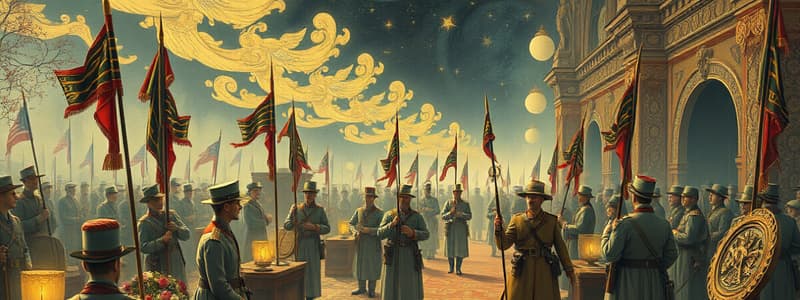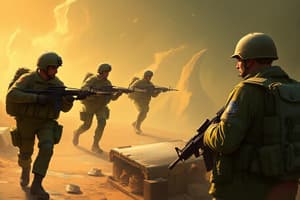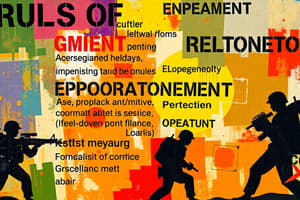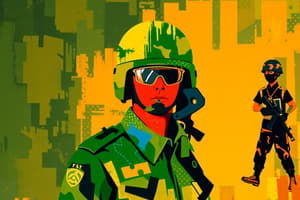Podcast
Questions and Answers
What is armament?
What is armament?
War equipment and supplies.
What is conscription?
What is conscription?
A compulsory enrollment of men for military service; draft.
What is imperialism?
What is imperialism?
The development of forcing trade and exploration of raw materials of backward countries through political or military means.
What is nationalism?
What is nationalism?
Who were the Bolsheviks?
Who were the Bolsheviks?
What does bourgeoisie refer to?
What does bourgeoisie refer to?
What is a Czar?
What is a Czar?
What is the Duma?
What is the Duma?
What is a manifesto?
What is a manifesto?
What does Marxist relate to?
What does Marxist relate to?
Who were the Mensheviks?
Who were the Mensheviks?
What is proletariat?
What is proletariat?
What does it mean to abdicate?
What does it mean to abdicate?
What is anarchy?
What is anarchy?
What is a Czarina?
What is a Czarina?
What is a soviet?
What is a soviet?
What are reparations?
What are reparations?
What is a recession?
What is a recession?
What is fascism?
What is fascism?
What does totalitarian mean?
What does totalitarian mean?
What does it mean to demilitarize?
What does it mean to demilitarize?
Flashcards are hidden until you start studying
Study Notes
Key Terms and Definitions
-
Armament: Refers to war equipment and supplies crucial for military operations.
-
Conscription: A mandatory enlistment of individuals into military service; commonly known as a draft.
-
Imperialism: The act of extending a nation's power through the forced trade and extraction of resources from less developed countries, often involving political or military control.
-
Nationalism: A strong allegiance to one's nation and its cultural, social, and political interests, often leading to the desire for independence or dominance.
-
Bolshevik: Members of the revolutionary left-wing faction of the Russian Social Democratic Workers' Party, who took control in November 1917 and later formed the Russian Communist Party.
-
Bourgeoisie: The wealthy middle class that, according to Marxist theory, owns the majority of resources and capital, often benefiting from the exploitation of the working class.
-
Czar: The title for male monarchs in Russia before 1917, equivalent to emperor; derived from the Russian word for caesar.
-
Duma: The legislative assembly in czarist Russia, functioning similarly to a parliament.
-
Manifesto: A public declaration of principles, beliefs, and policies often associated with political movements; notably includes the Communist Manifesto by Karl Marx and Friedrich Engels.
-
Marxist: Pertaining to the ideas and theories put forth by Karl Marx, particularly those addressing class struggle and economic systems.
-
Menshevik: Members of the more moderate faction of the Russian Social Democratic Party, who opposed the Bolsheviks during the Russian Revolution.
-
Proletariat: The working class, especially industrial workers, who rely on selling their labor for survival, as noted in Marxist ideology.
-
Abdicate: To formally relinquish a position of high authority such as a throne, leading to the surrender of power.
-
Anarchy: A situation in which society operates without a governing body or established laws.
-
Czarina: The female counterpart of a czar, referring to a female monarch in Russia prior to 1917.
-
Soviet: Local councils formed during the Russian Revolution, composed of representatives from workers, soldiers, and peasants that aimed to organize and govern society.
-
Reparations: Payments made by countries defeated in war to compensate for the damage caused during conflicts.
-
Recession: A period marked by a decline in economic activity, particularly within the commercial and industrial sectors.
-
Fascism: A totalitarian political system where a single party controls the state, often characterized by authoritarian governance and suppression of opposition, maintained through military force and control of the economy.
-
Totalitarian: Describing a political system where a single-party regime suppresses dissent and exerts extensive control over public and private life.
-
Demilitarize: The process of removing military forces and equipment from an area to establish neutrality, often in post-conflict scenarios.
Studying That Suits You
Use AI to generate personalized quizzes and flashcards to suit your learning preferences.




